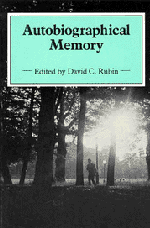Book contents
- Frontmatter
- Contents
- List of contributors
- Preface
- Part I Overview
- Part II Historical, theoretical, and methodological contexts for the study of autobiographical memory
- Part III The general organization of autobiographical memory
- Part IV The temporal organization of autobiographical memory
- 9 Public memories and their personal context
- 10 Temporal reference systems and autobiographical memory
- Part V Temporal distributions of autobiographical memories
- Part VI Failures of autobiographical memory
- Author index
- Subject index
9 - Public memories and their personal context
Published online by Cambridge University Press: 01 March 2011
- Frontmatter
- Contents
- List of contributors
- Preface
- Part I Overview
- Part II Historical, theoretical, and methodological contexts for the study of autobiographical memory
- Part III The general organization of autobiographical memory
- Part IV The temporal organization of autobiographical memory
- 9 Public memories and their personal context
- 10 Temporal reference systems and autobiographical memory
- Part V Temporal distributions of autobiographical memories
- Part VI Failures of autobiographical memory
- Author index
- Subject index
Summary
History is an extension of memory.
M. White (1963)The reality of these events does not consist in the fact that they occurred but that, first of all, they were remembered, and, second, that they are capable of finding a place in a chronologically ordered sequence.
H. White (1980)Introduction
Every day dozens of noteworthy events are reported in newspapers, on television, and in radio broadcasts. Depending on your reading, viewing, and listening habits, you may be exposed to several different descriptions of the same event over the course of a single day, or you may have to endure hearing the same version repeated a number of times. Further, these events may come up again in conversation and as the topics of magazine articles or film documentaries. The point is that exposure to current events is a common, almost unavoidable part of our daily experience and that information concerning these events, extracted from the media and from our interactions with others, is learned in the context of our own lives.
In this chapter we explore how the knowledge people have of recent history (public memories) is linked to their knowledge of their lives (personal or autobiographical memories). We expect a given public memory to be a blend of facts about the public circumstances in which the event occurred and facts about the personal matrix in which that information was acquired.
- Type
- Chapter
- Information
- Autobiographical Memory , pp. 137 - 158Publisher: Cambridge University PressPrint publication year: 1986
- 43
- Cited by

